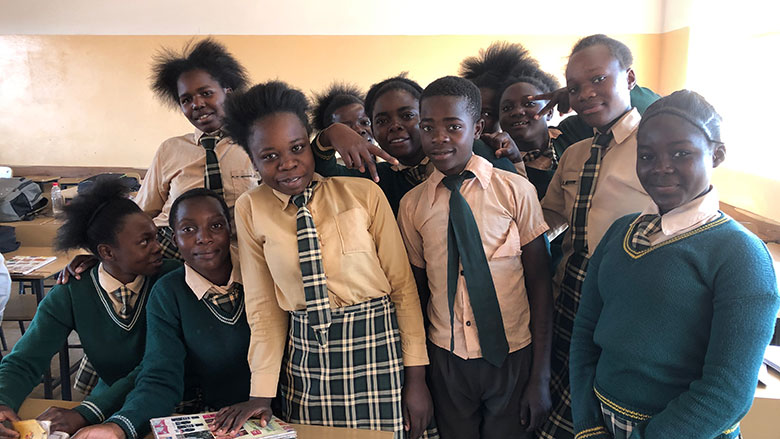LUSAKA, November 19, 2019 – When Mary Phiri started secondary school two years ago, she had to walk about 18 kilometers every day from Palabana to get to the nearest school, in Lusaka Province. Although she was a top student during her primary years, her academic performance suffered because she was tired most times from walking the long distance to and from school.
But with the construction of a new secondary school, Phiri now walks two kilometers to get to class.
“Now my grades are above average, because I am not too tired to study when I get home,” Phiri said.
Under the IDA-funded Zambia Education Enhancement Project, Palabana primary school is being expanded to a full-fledged day secondary school. Four classrooms and one ablution block for girls have been completed; construction of the remaining classrooms is expected to start in November 2019 and completed in February 2020 under Phase II.
“Once completed, Palabana primary school will be the only secondary school in that area,” said, Cecilia Banda, District Education Board Secretary for Chongwe. “Four other primary schools—two government and two community primary schools—in the same catchment area will also be able to send their pupils to the new school.”
Palabana primary school is one of 82 schools in Zambia that are being expanded to include secondary schools under ZEEP. Of those, 10 are in Lusaka Province.
“Palabana was selected for expansion into a secondary school using a robust and transparent composite index and availability of secondary schools in the local area,” explained Nalin Jena, World Bank Senior Education Specialist and Task Team Leader for the project.
Through ZEEP, community involvement is at the center of school expansion. For example, site selection involves intensive consultation with the local community and the local education officials. The District Education Boards Secretary (DEBS) and her team and the District Commissioner (DC) support the community to ensure quality and timeliness of construction.
Secondary schools supported by ZEEP include five classrooms (grade 8-12), two ablution blocks (toilet and showers) for boys and girls, one administration block, one laboratory and home economics block, furniture and laboratory equipment, a water supply system, sewage disposal system four low-cost staff houses, and power supply either through solar mini grid or mainstream electricity grid. The water and sanitation facilities are especially critical for keeping the girls in schools.
In addition, 10 of the 82 schools will have weekly boarding facilities for girls including dormitories where female students from far distance will stay during the week under the guidance of the school management. This type of boarding facility is especially popular as many students are not able to afford fees for full-boarding and space is limited.
“Access to quality secondary education is key to poverty reduction,’ said Sahr Kpundeh, World Bank Country Manager for Zambia. “Global evidence confirms that girl’s participation in secondary education has positive impact on fertility rate, early marriage and pregnancy and has substantial intergenerational benefits, so we want to do everything we can to ensure Zambian girls access education.”
The school will also benefit from other activities under ZEEP, such as training of mathematics and science teachers, and receiving mathematics and science teaching and learning materials for every student. More than 22,960 students, 11,500 of them girls, are expected to benefit from the school expansion project. ZEEP also supports the government’s goal of providing access to safe secondary schools by reducing home-to-school distance.


